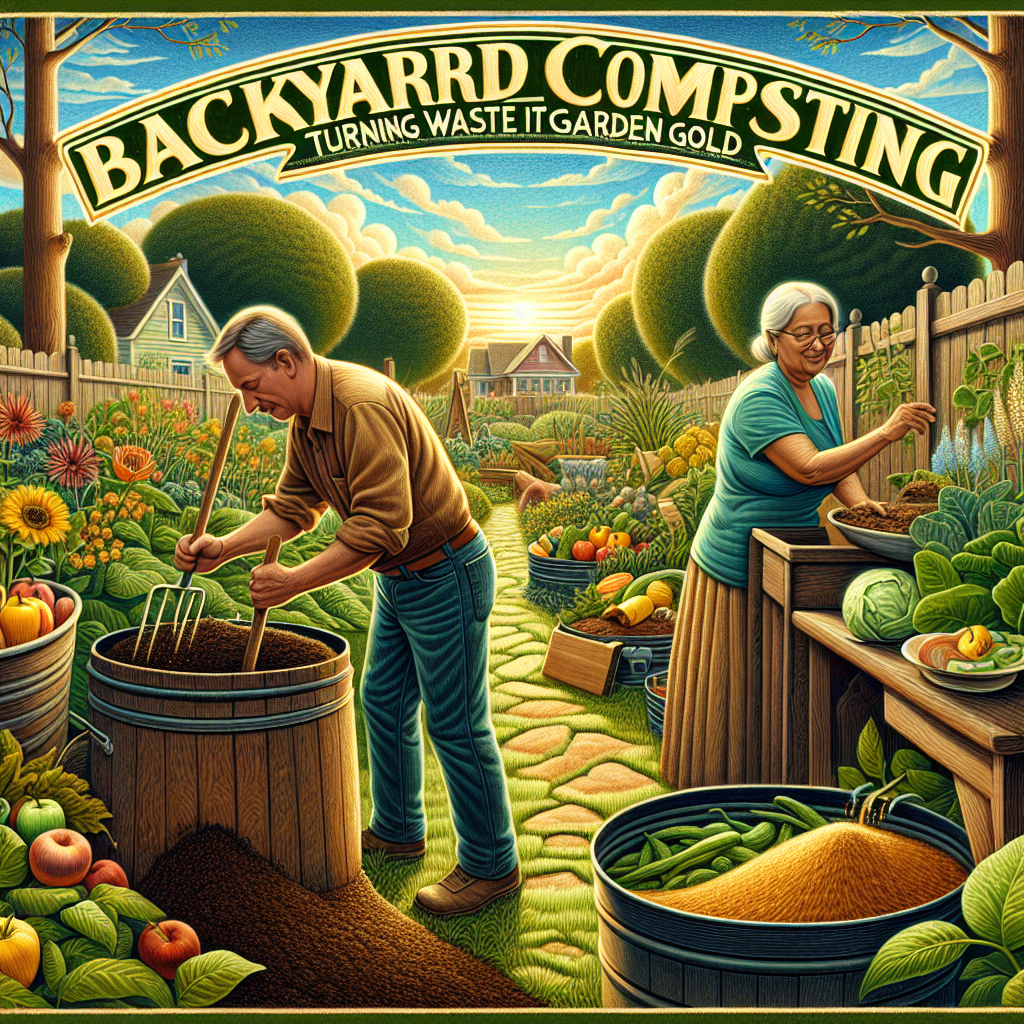Backyard Composting: Turning Waste into Garden Gold
Are you looking for a simple and effective way to enrich your garden soil while reducing kitchen and yard waste? Backyard composting is the answer. Not just a trend among garden aficionados, composting is an age-old practice that nurtures the earth and contributes to a sustainable environment. In this article, we’ll guide you through the basics of backyard composting and how you can transform your waste into garden gold.
Why Compost?
Composting is more than just a convenient method of waste disposal; it’s a process that benefits your garden in numerous ways. By adding compost to your garden, you’re improving soil structure, increasing nutrient content, and enhancing the soil’s ability to hold moisture. According to the United States Environmental Protection Agency (EPA), composting also reduces methane emissions from landfills and lowers your carbon footprint.
What Can You Compost?
The key to successful composting is balancing “greens” and “browns,” meaning nitrogen-rich materials and carbon-rich materials, respectively. Greens include fruit and vegetable scraps, coffee grounds, and grass clippings, while browns consist of dry leaves, straw, wood chips, and shredded newspaper. It’s important to avoid composting meat, dairy, and oily foods as they can attract pests and create odors.
Setting Up Your Compost Bin
When choosing a spot for your compost bin, look for a level, well-drained area. There are numerous styles of bins available to purchase, or you can opt for a DIY approach. Consider The Compost Wizard for a user-friendly, ready-to-go option. If you’re handy, you can construct your bin using recycled wood pallets or wire mesh.
The Composting Process
Step 1: Starting Your Compost Pile
Begin by layering browns and greens in your compost bin, aiming for a ratio of about 3:1 of browns to greens. Chopping larger pieces will accelerate the decomposition process.
Step 2: Maintenance
For efficient composting, it’s beneficial to turn your compost pile every week or two, which aerates the pile and helps to speed up the breakdown of materials. The compost should be kept moist, but not wet. Think of the dampness of a wrung-out sponge.
Step 3: Harvesting Your Compost
Your compost will be ready when it’s dark, crumbly, and mostly uniform in texture—it typically takes anywhere from two to six months. You’ll know it’s done when the original ingredients are no longer recognizable, and it smells like earth.
Common Composting Challenges
One obstacle you might face is an imbalance in your green and brown materials. If your pile is too wet and smelly, add more browns; if it’s too dry, add more greens and a bit of water. Also, critters can sometimes become interested in your compost pile, especially if you accidentally include materials that should not be composted. Keep your bin secure and manage what goes into it.
Benefits of Compost in the Garden
Compost enriches the soil by adding essential nutrients plants need to thrive. It also improves soil structure, promotes soil fertility, and encourages the production of beneficial bacteria and fungi. These benefits result in healthier plants, which are more resistant to diseases and pests.
Getting the Most Out of Your Compost
Once your compost is ready, you can use it in various ways. You can mix it into garden beds and pots, use it as mulch, or make “compost tea” by steeping compost in water and using the liquid to water plants. However you choose to use it, the infused nutrients will give your plants a significant boost.
Final Thoughts
Composting is an incredibly effective tool for any gardener looking to improve their soil quality and contribute to a healthier planet. The beauty of composting lies in its simplicity and the value it brings to your gardening efforts. It’s an ideal way to turn everyday waste into a resource that benefits your garden, your home, and the environment.
If you’re passionate about gardening and sustainability, embarking on the composting journey can be immensely rewarding. Head over to websites like Good Housekeeping for more tips on getting started and maintaining your compost pile.
Remember, small actions like composting can lead to significant changes over time. By turning your waste into garden gold, you’re not only reaping the rewards of a vibrant garden, but you’re also playing a part in a larger environmental movement. Start composting today and watch as your garden thrives, all the while knowing you’re making a difference.
In the world of backyard composting, patience is a virtue, and persistence pays off. Whether you’re a seasoned green thumb or a gardening novice, the transformation of natural waste into precious compost is a process that is as enriching for the spirit as it is for the earth. Embark on this eco-friendly journey, and you might find that composting isn’t just about nurturing plants—it’s about cultivating a more sustainable lifestyle.
Happy composting, and may your garden bloom brighter with each addition of your homemade black gold.

